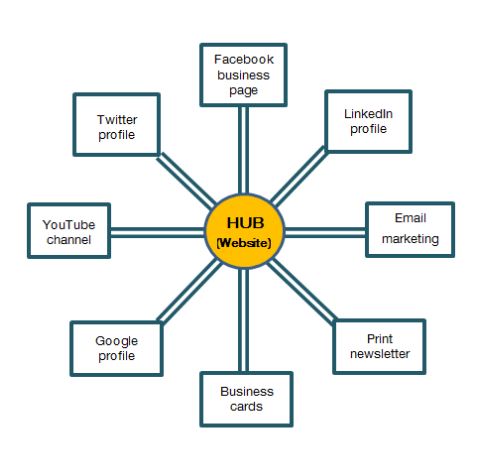All of your efforts to create meaningful digital content should direct consumers to a place where you can obtain their contact information and collect information about their needs and wants. This place is called a hub. Your hub can be a website, a landing page, a digital business card, a blog, or any other kind of web property administered by you as a central place to showcase your business online.
Your hub is the foundation of your digital presence. It’s your home base—the place you want to drive consumers to so that you can do business with them. You use your hub to demonstrate expertise, build community, and capture and convert clients.
As shown in the figure below, spokes are touch points where you interact with your community or communities in all of your digital activities and, in many cases, your offline activities, as well. You can use the engagement and interaction that occur in the spokes to drive traffic back to your hub.
 There’s an old saying in sales that consumers don’t care what you know until they know what you care about, so your hub should demonstrate the following points in a professional manner:
There’s an old saying in sales that consumers don’t care what you know until they know what you care about, so your hub should demonstrate the following points in a professional manner:
- Who you are: What are your core values? What are your interests?
- What you know: Many agents say that they’re number one. Telling consumers that you’re number one doesn’t demonstrate expertise; it demonstrates ego. Today’s consumers don’t care what you claim; they care about your expertise.
- Where you are: Real estate expertise is local. Practice varies from state to state, region to region, and sometimes even town to town. Consumers want to hire someone who understands the area and community of interest, as well as the customary usages and laws. Demonstrating your connections to the area you serve is important.
- Why they should care: People need to be able to connect with you. Online, as in person, the first way to connect with someone is by finding common ground. Common ground could be a hobby you enjoy, a sports team you root for, a favorite restaurant, the place you grew up, the high school you attended, or any experience that you and the other person share. Areas of common ground are an important first step in creating rapport and building a relationship with a consumer. Think about how consumers may react to content you share on your hub, because it’s something you have in common with them. How will they feel if you’re providing them with something they want and value? These social techniques predispose people to like and trust you, making them more likely to contact you.
- How you do what you do: Many consumers think that all real estate licensees are created equally, but as salespeople, we strive to be different and set ourselves apart from the pack. Here’s where you can establish your point of differentiation. Are you an investment expert? A specialist in historic homes? Someone skilled at working with first-time homebuyers? Or, do you use technology in a unique manner that makes it easier for the buyer or seller to work with you? Whatever your business model or methods, here’s the place to exhibit them so you stand out.
- How to contact you: When you interact with consumers on other sites, they may head back to your hub to find more information about you and how to reach you. Make it easy for them to contact you.
For much more about creating your digital presence, check out our featured product this month at the Center for REALTOR® Development, the NEW e-PRO® Day 1 and 2 bundle, which is the educational requirement for NAR’s e-PRO® certification and is on sale this entire month of December at 25 percent off. This certification aims to help real estate professionals broaden their technology skills to connect effectively with today’s digitally-savvy consumer.
For more information, visit onlinelearning.realtor.
For the latest real estate news and trends, bookmark RISMedia.com.











